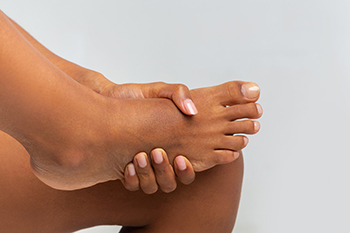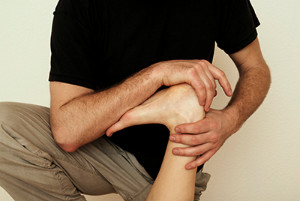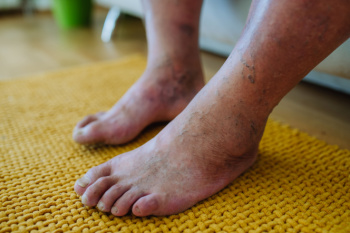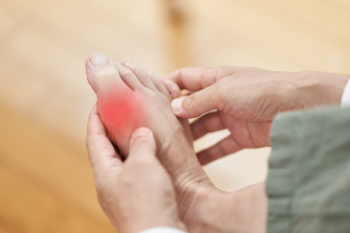June 2024
Treatment and Prevention of Common Foot Problems

Throughout your life, your feet will carry you thousands of miles, enduring wear and tear that can lead to various common foot problems. Aging feet are prone to widening and arch collapse, which can increase the likelihood of issues like plantar fasciitis, flat feet, and osteoarthritis. Regular self-examinations can help you identify early signs of trouble, such as calluses, blisters, and discolored toenails, which may require changes in footwear or custom orthotics. Plantar fasciitis, marked by heel pain, often benefits from performing specific exercises, and supportive shoe inserts. Flat feet, where your arches have flattened out, can cause discomfort and swelling, best managed with orthotic inserts and shoes with arch support. Additionally, osteoarthritis in your feet can lead to joint pain and stiffness, manageable through topical pain relievers, anti-inflammatory medications, and sometimes corticosteroid injections. Proactive foot care and seeking timely treatment for foot problems are important ways to maintain your mobility and improve quality of life. If you are experiencing persistent foot pain or discomfort, it is suggested that you schedule an appointment with a podiatrist for specialized foot care.
Everyday foot care is very important to prevent infection and other foot ailments. If you need your feet checked, contact Steven Spivak, DPM from Mount Holly Family Footcare. Our doctor can provide the care you need to keep you pain-free and on your feet.
Everyday Foot Care
Often, people take care of their bodies, face and hair more so than they do for their feet. But the feet are a very important aspect of our bodies, and one that we should pay more attention to. Without our feet, we would not be able to perform most daily tasks.
It is best to check your feet regularly to make sure there are no new bruises or cuts that you may not have noticed before. For dry feet, moisturizer can easily be a remedy and can be applied as often as necessary to the affected areas. Wearing shoes that fit well can also help you maintain good foot health, as well as making it easier to walk and do daily activities without the stress or pain of ill-fitting shoes, high heels, or even flip flops. Wearing clean socks with closed shoes is important to ensure that sweat and bacteria do not accumulate within the shoe. Clean socks help to prevent Athlete’s foot, fungi problems, bad odors, and can absorb sweat.
If you have any questions please feel free to contact our office located in Lumberton, NJ . We offer the newest diagnostic and treatment technologies for all your foot and ankle needs.
Effective Foot Stretches and Their Benefits

Foot stretches offer a simple yet powerful way to improve flexibility, relieve tension, and prevent injuries. One effective stretch is the toe stretch, where you sit back on your heels, gently pressing your toes into the ground to stretch the top of the foot. Another beneficial stretch is the calf stretch, achieved by placing hands on a wall, stepping one foot back, and pressing the heel into the ground while keeping the back leg straight. Additionally, the plantar fascia stretch targets the sole of the foot, as you sit with one leg crossed over the other, gently pulling your toes back towards the shin. These stretches can alleviate discomfort caused by conditions like plantar fasciitis and Achilles tendonitis, while also enhancing overall foot mobility and function. Incorporating these stretches into your daily routine, especially before and after physical activity. If you are interested in learning more about specific foot stretches and how they can help relieve foot pain, it is suggested that you contact a podiatrist.
Why Stretching Is Important for Your Feet
Stretching the feet is a great way to prevent injuries. If you have any concerns with your feet consult with Steven Spivak, DPM from Mount Holly Family Footcare. Our doctor will assess your condition and provide you with quality foot and ankle treatment.
Stretching the Feet
Stretching the muscles in the foot is an important part in any physical activity. Feet that are tight can lead to less flexibility and make you more prone to injury. One of the most common forms of foot pain, plantar fasciitis, can be stretched out to help ease the pain. Stretching can not only ease pain from plantar fasciitis but also prevent it as well. However, it is important to see a podiatrist first to determine if stretching is right for you. Podiatrists can also recommend other ways to stretch your feet. Once you know whether stretching is right for you, here are some excellent stretches you can do.
- Using a foam roller or any cylindrical object (a water bottle or soda can will do), roll the object under your foot back and forth. You should also exert pressure on the object. Be sure to do this to both feet for a minute. Do this exercise three times each.
- Similar to the previous exercise, take a ball, such as a tennis ball, and roll it under your foot while seated and exert pressure on it.
- Grab a resistance band or towel and take a seat. If you are using a towel, fold it length wise. Next put either one between the ball of your foot and heel and pull with both hands on each side towards you. Hold this for 15 seconds and then switch feet. Do this three times for each foot.
- Finally hold your big toe while crossing one leg over the other. Pull the toe towards you and hold for 15 seconds. Once again do this three times per foot.
It is best to go easy when first stretching your foot and work your way up. If your foot starts hurting, stop exercising to ice and rest the foot. It is advised that you then see a podiatrist for help.
If you have any questions, please feel free to contact our office located in Lumberton, NJ . We offer the newest diagnostic and treatment technologies for all your foot care needs.
Fear of Falling Among Diabetics
 Diabetic foot problems and the fear of falling are significant concerns for individuals managing diabetes. Diabetes can lead to various complications, including neuropathy and peripheral vascular disease, or PAD, which affect sensation and blood flow to the feet. As a result, individuals with diabetes may experience decreased balance, altered gait, and diminished sensation, increasing their risk of falls. Furthermore, diabetic foot complications, such as foot ulcers and infections, can further impair mobility and increase the fear of falling. The fear of falls can lead to decreased physical activity and social isolation, impacting overall quality of life. To address these concerns effectively, it is suggested that individuals with diabetes include a podiatrist as part of their healthcare team. Podiatrists specialize in foot care and can assess and manage diabetic foot complications, provide preventive measures, and offer guidance to reduce the risk of falls.
Diabetic foot problems and the fear of falling are significant concerns for individuals managing diabetes. Diabetes can lead to various complications, including neuropathy and peripheral vascular disease, or PAD, which affect sensation and blood flow to the feet. As a result, individuals with diabetes may experience decreased balance, altered gait, and diminished sensation, increasing their risk of falls. Furthermore, diabetic foot complications, such as foot ulcers and infections, can further impair mobility and increase the fear of falling. The fear of falls can lead to decreased physical activity and social isolation, impacting overall quality of life. To address these concerns effectively, it is suggested that individuals with diabetes include a podiatrist as part of their healthcare team. Podiatrists specialize in foot care and can assess and manage diabetic foot complications, provide preventive measures, and offer guidance to reduce the risk of falls.
Diabetic foot care is important in preventing foot ailments such as ulcers. If you are suffering from diabetes or have any other concerns about your feet, contact Steven Spivak, DPM from Mount Holly Family Footcare. Our doctor can provide the care you need to keep you pain-free and on your feet.
Diabetic Foot Care
Diabetes affects millions of people every year. The condition can damage blood vessels in many parts of the body, especially the feet. Because of this, taking care of your feet is essential if you have diabetes, and having a podiatrist help monitor your foot health is highly recommended.
The Importance of Caring for Your Feet
- Routinely inspect your feet for bruises or sores.
- Wear socks that fit your feet comfortably.
- Wear comfortable shoes that provide adequate support.
Patients with diabetes should have their doctor monitor their blood levels, as blood sugar levels play such a huge role in diabetic care. Monitoring these levels on a regular basis is highly advised.
It is always best to inform your healthcare professional of any concerns you may have regarding your feet, especially for diabetic patients. Early treatment and routine foot examinations are keys to maintaining proper health, especially because severe complications can arise if proper treatment is not applied.
If you have any questions please feel free to contact our office located in Lumberton, NJ . We offer the newest diagnostic and treatment technologies for all your foot and ankle needs.
Symptoms and Management of Early Onset Gout

Early onset gout, a form of arthritis, can be a debilitating condition that disrupts daily life and impacts overall well-being. Gout typically manifests as sudden and intense pain, swelling, and tenderness in the joints, often affecting the big toe initially. This inflammatory response occurs due to the buildup of uric acid crystals in the joints, resulting from an imbalance in the body's production and excretion of uric acid. While gout is commonly associated with older age and certain lifestyle factors, like diet and alcohol consumption, it can also develop in younger individuals, often due to genetic predisposition or underlying health conditions. Managing early onset gout involves a multifaceted approach, including medication to alleviate symptoms, dietary modifications to reduce purine-rich foods, and lifestyle changes to maintain a healthy weight and minimize alcohol intake. Gout typically affects the big toe, and can cause severe pain and discomfort. If you have been afflicted with gout, it is suggested that you seek prompt attention from a podiatrist who can offer you relief and prevention methods.
Gout is a foot condition that requires certain treatment and care. If you are seeking treatment, contact Steven Spivak, DPM from Mount Holly Family Footcare. Our doctor will treat your foot and ankle needs.
What Is Gout?
Gout is a type of arthritis caused by a buildup of uric acid in the bloodstream. It often develops in the foot, especially the big toe area, although it can manifest in other parts of the body as well. Gout can make walking and standing very painful and is especially common in diabetics and the obese.
People typically get gout because of a poor diet. Genetic predisposition is also a factor. The children of parents who have had gout frequently have a chance of developing it themselves.
Gout can easily be identified by redness and inflammation of the big toe and the surrounding areas of the foot. Other symptoms include extreme fatigue, joint pain, and running high fevers. Sometimes corticosteroid drugs can be prescribed to treat gout, but the best way to combat this disease is to get more exercise and eat a better diet.
If you have any questions please feel free to contact our office located in Lumberton, NJ . We offer the newest diagnostic and treatment technologies for all your foot and ankle needs.





